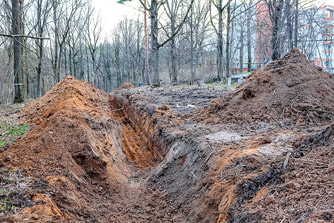
Yet I wonder if the wider problem is that, as modern humans, we ask too much of the land, and do not live with it, and learn from it, as our forbears did so much better. Modern farming methods leave little opportunity for the land to regenerate. We expect higher and higher yields, while giving back too little. At the same time. we have become increasingly detached from the land and lack a sound appreciation of all that it constantly gives to us. The writer Annie Dillard, for example, tells us that “In the top inch of forest soil, biologists found an average of 1,356 living creatures . . . including 865 mites, 265 springtails, 22 millipedes, 29 adult beetles and various numbers of 12 other forms . . . . Had an estimate also been made of the microscopic population, it might have ranged up to two billion bacteria and many millions of fungi, protozoa, and algae—in a mere teaspoonful of soil.” Isn’t that amazing? How would it be if we, seriously, stopped for a moment, to consider such things? What difference would it make? Could we find forgiveness with the land, and stop being unforgiving servants?
During the major Covid-19 lockdowns earlier this year, there was a real sense that the lands of the Earth, on which we all depend, were able to breathe more freely. Anecdotally, many of us shared in this as we saw aspects of wider nature return: more butterflies flying in our gardens for example, fuller and brighter birdsong. Yet recent reports suggest this was indeed but a breather, a brief moment of release for our wider Creation. Current calculations show, for instance, that the rate of human induced climate change will not slow in this otherwise extraordinary virus impacted year. The Covid-19 virus itself cannot bring a fresh direction – that is repentance – from humanity. All it can do is to challenge us to face up to realities, and, as with the short breather for our planet earlier this year, show us what the fruits might be for another way forward.
Speaking fruitfully, one of the most wonderful jobs I’ve ever had was that of Rural and Environment Adviser for the Diocese of Durham, part of a then network of church rural officers across England. It was a great joy, as it involved me traveling across the rugged yet beautiful lands of my birth, working with extraordinary farmers, conservationists, and people of faith, who truly connected with the ground which gave us life. We worked together for a better land, in an area exploited for many generations, not least through unjust mining developments. In that task, I and others were drawn back to core biblical understandings of the land, which are inextricably bound up together in relationship with God and God’s people. For, in the Hebrew scriptures especially, it makes no sense to speak of loving human relationship to God without loving relationship to land. God-people-land form one covenant, in which each part is crucial. As the book of Deuteronomy above all attests, if we betray any one element – whether God, other human beings, or the land itself – we betray the other elements too. We are then called to seeking forgiveness so that renewed healing with justice – biblical shalom – may ensue.
How do we nurture forgiveness from the land in this land? Surely this can only result from listening afresh to the land itself and to those closest to it: to the best of our environmental scientists and farming community, and, above all, to the First Nations peoples of Australia. For there is a radical difference, isn’t there, between being in true, deep, covenantal relationship with the land, and simply living on or with it. White western people typically view land as something which belongs to them/us. Indigenous peoples across the world affirm, like biblical wisdom, that is the other way around. We belong to the land, for, at best it is only loaned to us by God, the Spirit of all Creation. Only when we start understanding that fully, and act upon it, will we be on the right track. For forgiveness, and fresh possibilities of new life, always involve repentance, changing our orientation. This applies just as much in ecological issues, as it does to community, or personal life.
In my country of birth, there has been some progress in ecological repentance in restoring the land. The Hedgerows Regulations passed in 1997, for example, give greater protection to the soil, and those who depend upon it. Yet such achievements are limited and fragile. We need to go deeper. To truly repent and become faithful stewards of the land, we need a profounder sense of our intimate relationship to the land. To receive the forgiveness of the land and of God, we need to know ourselves as bound together in a covenant of loving creation. For this reason, Indigenous people typically call the land our Mother. In recent times, Christian theologians have also explored how we might understand our planet Earth itself as the Body of God. When we see our land that way, we begin to understand more fully the truths attributed to Chief Seattle, that ‘what we do to the Earth, we do to ourselves.’2
In the name of Jesus, who lived humbly on the Earth and taught us to love its life and beauty from which we are born. Amen.
by Josephine Inkpin, for Land Sunday in the Season of Creation, @MiltonAnglicans, Sunday 13 September 2020
1 in English hedgerows – don’t cut them out!, CPRE report 2010
2. full speech here
 RSS Feed
RSS Feed